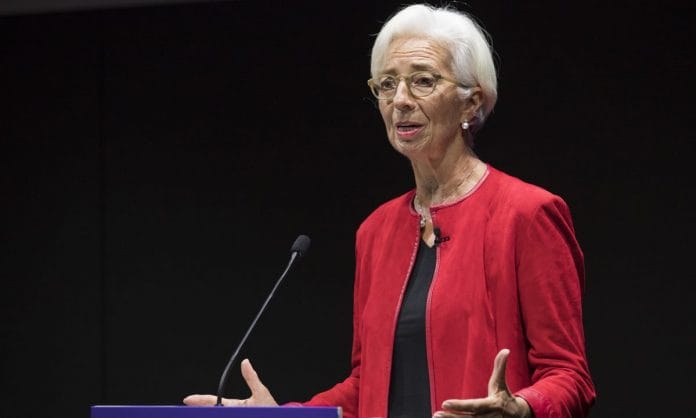The trade clash between the US and China has intensified the past few months, and emerging markets have taken a hit.
Christine Lagarde and the IMF have answered the easy question but dodged the hard ones. Yes, of course an era of tit-for-tat tariffs dims the global economic outlook. So … what can the International Monetary Fund do about it? Does it need more funding to protect the international economy, given the weakening scene?
Director Lagarde should say so directly and, if so, petition the shareholders, of which the U.S. is the biggest.
Her allusions to IMF coffers are limited now to asides like this line buried halfway through this speech on Monday: “Guarding against turbulence also requires a strong financial safety net, which in turn means a well-equipped and well-resourced IMF at its center. This will ensure the Fund can play its unique role in helping countries deal with future crises.”
The trade clash between the U.S. and China has intensified the past few months, and emerging markets have taken a hit. Lagarde this week flagged cuts to growth estimates when the institution updates its World Economic Outlook on Oct. 9. Perhaps Lagarde is saving the capital question of cash for next week when the IMF gathers for its annual meeting in Bali, Indonesia.
When it comes to forecasting, the IMF is a cautious place. Big cuts are unlikely, especially when America powered along at a 4.1 percent clip in the second quarter. Growth is likely to have peaked with a whimper, not a bang, as I wrote in July.
The important issues may be just how lopsided the projections are and, specifically, how soft the numbers for the developing countries look. The former has consequences for the latter.
Emerging markets have been stressed by higher U.S. interest rates and the dollar. In some instances, like Turkey, Argentina, South Africa and Indonesia, the stress has been major. Indonesia, like much of Asia, is also caught in the trade crossfire.
It’s not a stretch to ask what plans the IMF has in the event it needs to come to the rescue. Sibling lender the World Bank got a capital increase from its shareholders this year. The IMF hasn’t publicly pressed for one and, to be fair, the need isn’t yet quite there. But a glance at what the IMF has pledged for Argentina is sobering: $57.1 billion over three years, a record.
When Lagarde has all her shareholders in one place by the beach, she should follow the example of one of her French predecessors. In September 1997, when the IMF held its annual meeting in Hong Kong, then IMF chief Michel Camdessus won a 45 percent increase in member contributions to the equivalent of about $285 billion.
Attendees at that 1997 meeting basked in the glow of China’s economic miracle and the peaceful handover of power in Hong Kong. Emerging market rumblings had pushed only Thailand into the arms of the IMF. Much worse was to follow in what became a full-blown financial crisis. Good thing the IMF was ready.
Will it be next time? I hope what we are seeing now from Lagarde is a very careful process of preparing that safety net – Bloomberg







Instead of augmenting the IMF’s resources, stop doing what President Obama called stupid **** . This is the first time the world is seeing the US administration actually lighting fires instead of helping put them out. On both trade and Iran sanctions, the EU should be taking the lead to stand up for what is right. It would be joined by several others.